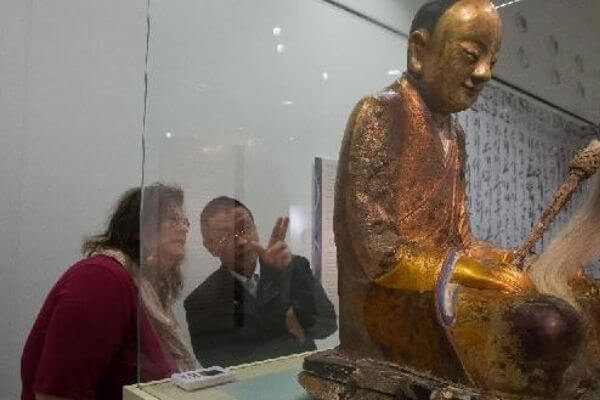
Samming Intermediate Court in Fujian rendered a first-instance judgment on the case of returning the Buddha statue with the mummified body of Zhanggong Zushi.
On 4 Dec. 2020, the Intermediate People’s Court of Sanming Municipality in Fujian Province (the Sanming Court) rendered a judgment in the case of recovering a mummified buddha statue (replevin), the villagers’ committees of Yangchun Village, and Dongpu Village (plaintiffs) v. O. Overeem et. al.
The Sanming Court ordered the defendant Overeem to return the Buddha statue with the mummified Buddha statue of Zhanggong Zushi (章公祖师) to the plaintiffs, villagers’ committees of Yangchun Village, and Dongpu Village in Wushan Township, Datian County, Fujian Province within 30 days as of the effective date of the judgment.
The case was officially registered on 11 Dec. 2015, and relevant materials were served to the defendant domiciled in the Netherlands through the international judicial assistance.
After adjudication, the Sanming Court held that the Buddha statue with the mummified body of Zhanggong Zushi is a collectively-owned cultural relic and that the villagers in Yangchun and Dongpu villages have the collective ownership of the the mummified Buddha statue, which shall be protected by law. As human remains constitute an important category of cultural heritage, the mummified Buddha statue shall be returned to its cultural origin and native environment.
After the death in the Northern Song Dynasty, Zhanggong Zushi was mummified into a golden Buddha statue and enshrined in Puzhao Temple (普照堂), which was owned jointly by Yangchun Village and Dongpu Village in Wushan Township, Datian County. In Dec. 1995, the mummified Buddha statue was found stolen by local villagers. Later in 2015, villagers in Yangchun and Dongpu villages discovered the Buddha statue on display at the Hungarian Natural Science Museum and the cultural relics department of Fujian Province also preliminarily confirmed that the Buddha statue on display was the mummified Buddha statue of Zhanggong Zushi stolen 20 years ago. The Dutch collector, Overeem, possessing the alleged stolen Budda statue, canceled the exhibition immediately.
In Nov. 2015, the villagers’ committees of Yangchun Village and Dongpu Village authorized Chinese and Dutch lawyers to file lawsuits for the return of the Buddha statue with the mummified Buddha statue, and filed parallel lawsuits both in China and the Netherlands.
Prior to this, the Dutch court dismissed the case on the ground that Chinese villagers’ committees did not have the standings to sue.
Contributors: Yanru Chen 陈彦茹









